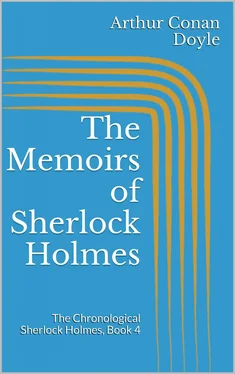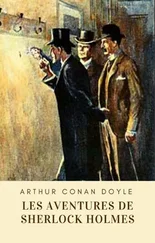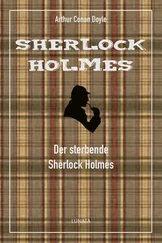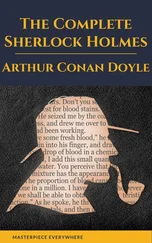“Is it not possible,” I suggested, “that the incised wound upon Straker may have been caused by his own knife in the convulsive struggles which follow any brain injury?”
“It is more than possible; it is probable,” said Holmes. “In that case one of the main points in favour of the accused disappears.”
“And yet,” said I, “even now I fail to understand what the theory of the police can be.”
“I am afraid that whatever theory we state has very grave objections to it,” returned my companion. “The police imagine, I take it, that this Fitzroy Simpson, having drugged the lad, and having in some way obtained a duplicate key, opened the stable door and took out the horse, with the intention, apparently, of kidnapping him altogether. His bridle is missing, so that Simpson must have put this on. Then, having left the door open behind him, he was leading the horse away over the moor, when he was either met or overtaken by the trainer. A row naturally ensued. Simpson beat out the trainer’s brains with his heavy stick without receiving any injury from the small knife which Straker used in self-defence, and then the thief either led the horse on to some secret hiding-place, or else it may have bolted during the struggle, and be now wandering out on the moors. That is the case as it appears to the police, and improbable as it is, all other explanations are more improbable still. However, I shall very quickly test the matter when I am once upon the spot, and until then I cannot really see how we can get much further than our present position.”
It was evening before we reached the little town of Tavistock, which lies, like the boss of a shield, in the middle of the huge circle of Dartmoor. Two gentlemen were awaiting us in the station—the one a tall, fair man with lion-like hair and beard and curiously penetrating light blue eyes; the other a small, alert person, very neat and dapper, in a frock-coat and gaiters, with trim little side-whiskers and an eye-glass. The latter was Colonel Ross, the well-known sportsman; the other, Inspector Gregory, a man who was rapidly making his name in the English detective service.
“I am delighted that you have come down, Mr. Holmes,” said the Colonel. “The Inspector here has done all that could possibly be suggested, but I wish to leave no stone unturned in trying to avenge poor Straker and in recovering my horse.”
“Have there been any fresh developments?” asked Holmes.
“I am sorry to say that we have made very little progress,” said the Inspector. “We have an open carriage outside, and as you would no doubt like to see the place before the light fails, we might talk it over as we drive.”
A minute later we were all seated in a comfortable landau, and were rattling through the quaint old Devonshire city. Inspector Gregory was full of his case, and poured out a stream of remarks, while Holmes threw in an occasional question or interjection. Colonel Ross leaned back with his arms folded and his hat tilted over his eyes, while I listened with interest to the dialogue of the two detectives. Gregory was formulating his theory, which was almost exactly what Holmes had foretold in the train.
“The net is drawn pretty close round Fitzroy Simpson,” he remarked, “and I believe myself that he is our man. At the same time I recognise that the evidence is purely circumstantial, and that some new development may upset it.”
“How about Straker’s knife?”
“We have quite come to the conclusion that he wounded himself in his fall.”
“My friend Dr. Watson made that suggestion to me as we came down. If so, it would tell against this man Simpson.”
“Undoubtedly. He has neither a knife nor any sign of a wound. The evidence against him is certainly very strong. He had a great interest in the disappearance of the favourite. He lies under suspicion of having poisoned the stable-boy, he was undoubtedly out in the storm, he was armed with a heavy stick, and his cravat was found in the dead man’s hand. I really think we have enough to go before a jury.”
Holmes shook his head. “A clever counsel would tear it all to rags,” said he. “Why should he take the horse out of the stable? If he wished to injure it why could he not do it there? Has a duplicate key been found in his possession? What chemist sold him the powdered opium? Above all, where could he, a stranger to the district, hide a horse, and such a horse as this? What is his own explanation as to the paper which he wished the maid to give to the stable-boy?”
“He says that it was a ten-pound note. One was found in his purse. But your other difficulties are not so formidable as they seem. He is not a stranger to the district. He has twice lodged at Tavistock in the summer. The opium was probably brought from London. The key, having served its purpose, would be hurled away. The horse may be at the bottom of one of the pits or old mines upon the moor.”
“What does he say about the cravat?”
“He acknowledges that it is his, and declares that he had lost it. But a new element has been introduced into the case which may account for his leading the horse from the stable.”
Holmes pricked up his ears.
“We have found traces which show that a party of gypsies encamped on Monday night within a mile of the spot where the murder took place. On Tuesday they were gone. Now, presuming that there was some understanding between Simpson and these gypsies, might he not have been leading the horse to them when he was overtaken, and may they not have him now?”
“It is certainly possible.”
“The moor is being scoured for these gypsies. I have also examined every stable and out-house in Tavistock, and for a radius of ten miles.”
“There is another training-stable quite close, I understand?”
“Yes, and that is a factor which we must certainly not neglect. As Desborough, their horse, was second in the betting, they had an interest in the disappearance of the favourite. Silas Brown, the trainer, is known to have had large bets upon the event, and he was no friend to poor Straker. We have, however, examined the stables, and there is nothing to connect him with the affair.”
“And nothing to connect this man Simpson with the interests of the Mapleton stables?”
“Nothing at all.”
Holmes leaned back in the carriage, and the conversation ceased. A few minutes later our driver pulled up at a neat little red-brick villa with overhanging eaves which stood by the road. Some distance off, across a paddock, lay a long grey-tiled out-building. In every other direction the low curves of the moor, bronze-coloured from the fading ferns, stretched away to the sky-line, broken only by the steeples of Tavistock, and by a cluster of houses away to the westward which marked the Mapleton stables. We all sprang out with the exception of Holmes, who continued to lean back with his eyes fixed upon the sky in front of him, entirely absorbed in his own thoughts. It was only when I touched his arm that he roused himself with a violent start and stepped out of the carriage.
“Excuse me,” said he, turning to Colonel Ross, who had looked at him in some surprise. “I was day-dreaming.” There was a gleam in his eyes and a suppressed excitement in his manner which convinced me, used as I was to his ways, that his hand was upon a clue, though I could not imagine where he had found it.
“Perhaps you would prefer at once to go on to the scene of the crime, Mr. Holmes?” said Gregory.
“I think that I should prefer to stay here a little and go into one or two questions of detail. Straker was brought back here, I presume?”
“Yes; he lies upstairs. The inquest is to-morrow.”
“He has been in your service some years, Colonel Ross?”
“I have always found him an excellent servant.”
Читать дальше












